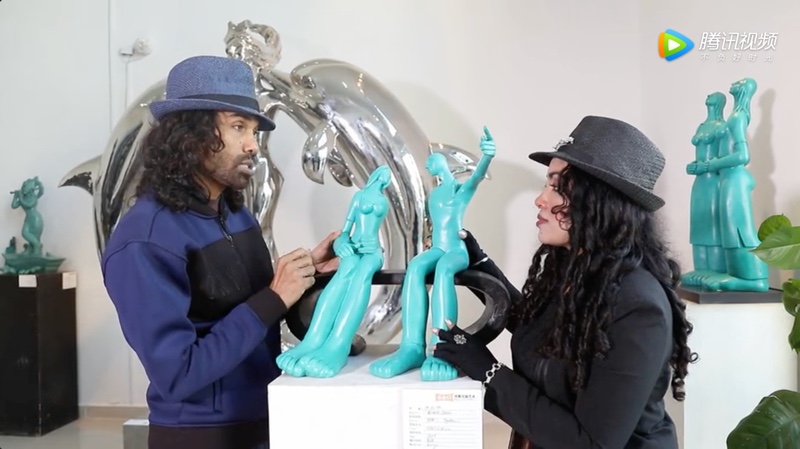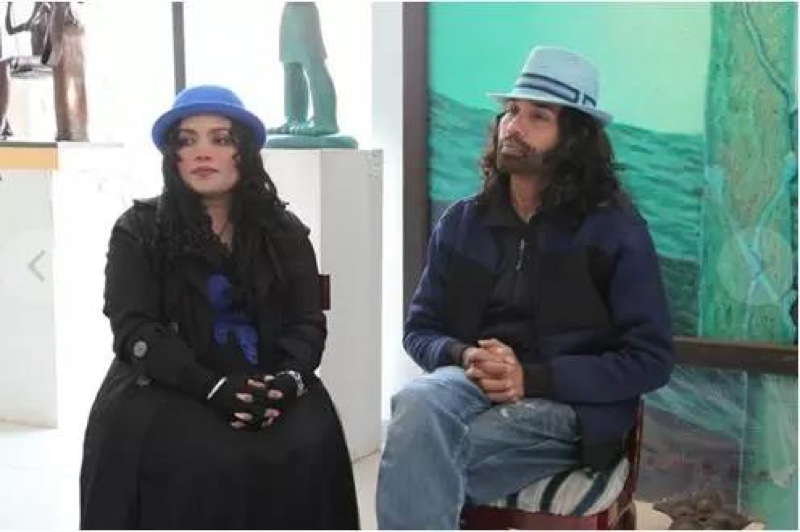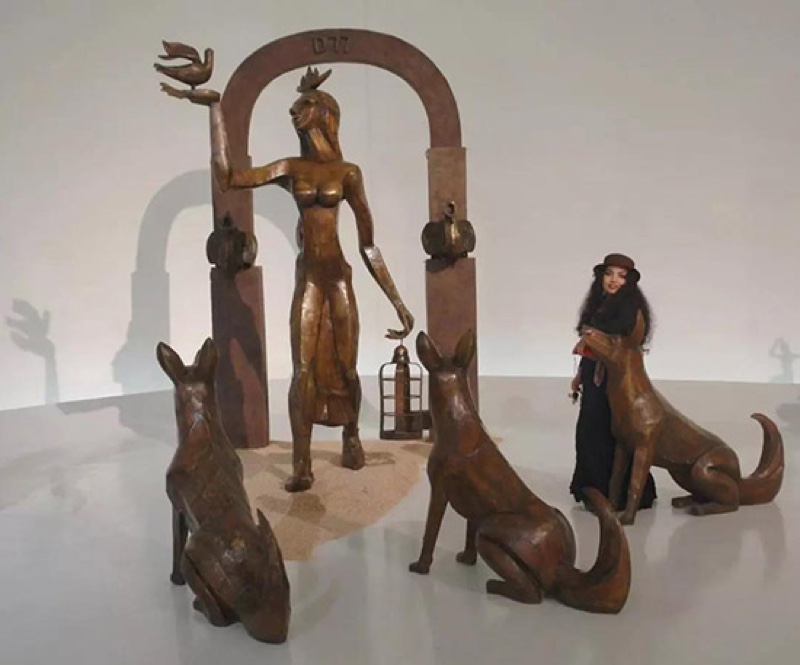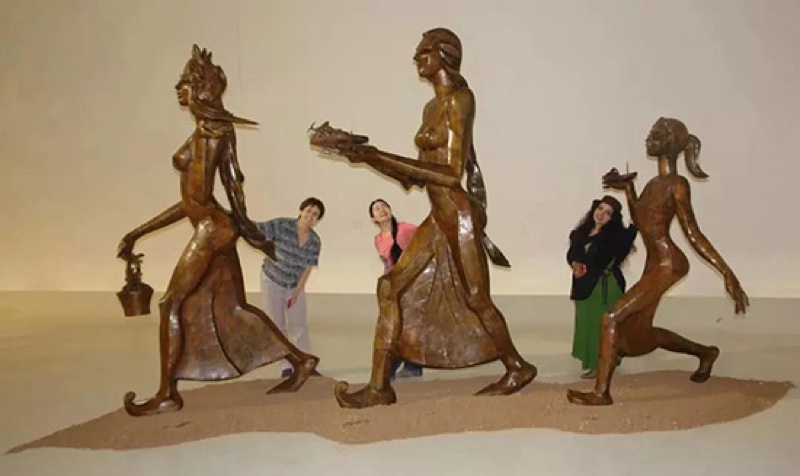面对面丨巴拉特和丽金:
推动中印文化艺术交流是一辈子的事
Face to face Bharat and Lijin:
Promoting Sino-Indian cultural and artistic exchanges is a lifetime
English version

巴拉特和丽金是一对来自印度的艺术家兄妹,他们在印度完成研究生学业后,以优异的成绩获得国家奖学金,来到中国继续深造,一待就是十五年。两位外国友人,不远万里来到中国,对中国人民有着深切的情谊,对中国文化有着不解的情愫,对中印文化艺术交流有着执着的追求。今天,京小雕带大家走进这对印度兄妹的工作室,欣赏他们对中印文化的艺术呈现,聆听他们在中国的学习和生活。同时,在他们的诉说中,也让我们默默感受文化自信更加彰显、国家文化软实力和中华文化影响力不断提升的中国!

京小雕(以下简称“京”):作为印度艺术家,为什么选择来到中国学习深造,并长期在这里发展?巴拉特(以下简称“巴”):我们在印度学习了雕塑和油画,完成了学业以后,我们以优异的成绩得到了国家派发的奖学金可以出国留学。来之前我们读过很多书,中国的文化打动了我们。在这之前,我们全家曾经在英国生活,也接触到很多西方的文化。相比而言,还是觉得我们东方的文化好,人与人的爱,人与人的关系,家庭的感觉,我们在西方找不到。而这里有发展,是最好的地方。中国的发展速度很快,我们艺术家有很多机会做雕塑。我们喜欢做雕塑,让全世界更多的人看到我们的雕塑。我们的作品在中国的很多城市,老百姓可以与我们的作品互动,我们的梦想在中国能实现。同时,因为中国有很多工厂、设备都特别强,制作雕塑也很方便。现在中国是我们的第二故乡,我们在印度出生,但是我们的家,我们的感情在中国,我们希望一直在中国做雕塑。

京:请你们介绍一下最初作品创作的艺术灵感来源和其中蕴含的印度文化。巴:在来中国之前,我和我妹妹的作品,没有受到中国教育的影响,都是包含印度文化和印度传统的教育在里面。比如说妹妹的这个作品叫《自由》。

这个作品是我们从小就听妈妈爸爸讲,这个地球不是只有印度,也不是只有人类在生活,动物也有一样的权利,自由生活的权利。我们的妈妈经常从市场上买下受困的小鸟,这一直是令我们记忆犹新的回忆。妈妈把它们带回家,并告诉我们,鸟儿和其他动物同我们人类一样,也享有自由的权利。我们应该让它们活着并享受自然之美。在印度文化中,对自由有着纯粹的向往。因此,在买回笼中的小鸟后,人们常常把它们放走以积福行善。所以,妹妹也常常从家里走出来,走到门口放走这些小鸟,我们的狗看着它们飞走了,这美妙的时刻激发了妹妹的灵感。这套作品试图重温这美好时光。今天我们需要友善地对待自然,让无辜的鸟儿和动物们幸福生活。想说的是,我们都要关心大自然,我们要关爱动物。这个就是我们印度基本的教育,这些也融入到我们的作品里面。还有妹妹的这个作品叫《去往寺庙的路上》。

丽金(以下简称“丽”):这个也是我小时候的一个记忆,当传统生活还未离我们逐渐远去的时候,不论何时,我都可以与姐妹们结伴而行,享受着去往寺庙的路上的快乐,然而随着城市的发展,生活节奏的加快,这些甜美的时光也渐渐成了记忆,所以我想把这些东西保留下来。
Bharat and Lijin are a pair of artists and brothers and sisters from India. After completing their postgraduate studies in India, they won national scholarships with excellent results and came to China to continue their studies. They stayed for fifteen years. The two foreign friends have come to China not far away, have deep friendship with the Chinese people, have incomprehensible feelings about Chinese culture, and have a persistent pursuit of Sino-Indian cultural and artistic exchanges.Today, Beijing Xiaodiao takes everyone into the studio of the Indian brothers and sisters, appreciates their artistic presentation of Chinese and Indian culture, and listens to their study and life in China. At the same time, in their complaints, let us also silently feel the cultural self-confidence more prominent, the national cultural soft power and the Chinese culture's influence is constantly improving China!
Beijing Xiaodiao (hereinafter referred to as "Beijing"): As an Indian artist, why did you choose to come to China to study further and develop here for a long time?
Bharat (hereinafter referred to as "Pak"): We studied sculpture and oil painting in India. After completing our studies, we received national scholarships with outstanding results to study abroad. We have read many books before, and the Chinese culture has touched us. Before this, our family used to live in the UK and was exposed to many Western cultures. In comparison, we still feel that our oriental culture is good, people's love, people's relationship, family feelings, we can't find it in the West. And there is development here, it is the best place. China's development is fast, and our artists have many opportunities to do sculpture. We like to make sculptures and let more people around the world see our sculptures. Our works are in many cities in China, and people can interact with our works, and our dreams can be realized in China. At the same time, because there are many factories and equipments in China, it is very convenient to make sculptures. Now China is our second hometown, we were born in India, but our home, our feelings are in China, we hope to have been doing sculpture in China.
Jing: Please tell us about the source of artistic inspiration for the original creation and the Indian culture contained in it.
Ba: Before coming to China, my sister's work was not influenced by Chinese education. It was an education that included Indian culture and Indian tradition. For example, the sister's work is called "Freedom."
This work is that we listened to my mother and dad from an early age. This earth is not only India, nor is it only human beings living, animals have the same rights and the right to live freely. Our mother often buys trapped birds from the market, which has always been a memory that we still remember. Mother took them home and told us that birds and other animals, like our human beings, also have the right to freedom. We should let them live and enjoy the beauty of nature. In Indian culture, there is a pure yearning for freedom. Therefore, after buying the birds in the cage, people often let them go to save for good. Therefore, my sister often came out from home, went to the door to let go of these birds, and our dogs watched them fly away. This wonderful moment inspired the sister's inspiration. This set of works tries to relive this good time. Today we need to treat nature with kindness and let innocent birds and animals live happily. What I want to say is that we all care about nature, we have to care for animals. This is our basic education in India, and these are also incorporated into our works. There is also a sister's work called "The Way to the Temple."
Li Jin (hereinafter referred to as "Li"): This is also a memory of my childhood. When traditional life has not moved away from us, I can go with my sisters and enjoy going to the temple whenever I am. The happiness of the road, but with the development of the city, the pace of life is accelerating, these sweet times have gradually become memories, so I want to keep these things.





